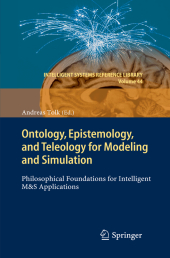 Neuerscheinungen 2014Stand: 2020-02-01 |
Schnellsuche
ISBN/Stichwort/Autor
|
Herderstraße 10
10625 Berlin
Tel.: 030 315 714 16
Fax 030 315 714 14
info@buchspektrum.de |

Andreas Tolk
Ontology, Epistemology, and Teleology for Modeling and Simulation
Philosophical Foundations for Intelligent M&S Applications
Herausgegeben von Tolk, Andreas
2013. 2014. xx, 372 S. 235 mm
Verlag/Jahr: SPRINGER, BERLIN; SPRINGER 2014
ISBN: 3-642-44281-1 (3642442811)
Neue ISBN: 978-3-642-44281-0 (9783642442810)
Preis und Lieferzeit: Bitte klicken
This crucial addition to the literature features internationally renowned authorities in science, computer science, and modeling and simulation, who explain the contribution that ontology, epistemology and teleology will make to next-generation applications.
In this book, internationally recognized experts in philosophy of science, computer science, and modeling and simulation are contributing to the discussion on how ontology, epistemology, and teleology will contribute to enable the next generation of intelligent modeling and simulation applications.
It is well understood that a simulation can provide the technical means to display the behavior of a system over time, including following observed trends to predict future possible states, but how reliable and trustworthy are such predictions? The questions about what we can know (ontology), how we gain new knowledge (epistemology), and what we do with this knowledge (teleology) are therefore illuminated from these very different perspectives, as each experts uses a different facet to look at these challenges. The result of bringing these perspectives into one book is a challenging compendium that gives room for a spectrum of challenges: from general philosophy questions, such as can we use modeling and simulation and other computational means at all to discover new knowledge, down to computational methods to improve semantic interoperability between systems or methods addressing how to apply the recent insights of service oriented approaches to support distributed artificial intelligence.
As such, this book has been compiled as an entry point to new domains for students, scholars, and practitioners and to raise the curiosity in them to learn more to fully address the topics of ontology, epistemology, and teleology from philosophical, computational, and conceptual viewpoints.
From the Contents: Truth, Trust, and Turing - Constraints for Modeling and Simulation.- Guidelines for Developing Ontological Architectures in Modeling and Simulation.- Ontologies in Modeling and Simulation: An Epistemological Perspective.- Ontological Implications of Modeling and Simulation in Postmodernity.- Models as Partial Explanations.- Theory Reconstruction of Several Versions of Modern Organization Theories.- Cutting Back Models and Simulations.- Philosophical Aspects of Modeling and Simulation.- Philosophical and Theoretic Underpinnings of Simulation Visualization Rhetoric and their Practical Implications.
From the reviews:
Selected by Computing Reviews as one of the Best Reviews & Notable Books of 2013
"The clarity and style of writing make them accessible to readers coming from the sciences, engineering, or economics. ... This is a book worth reading and rereading." (Anthony J. Duben, Computing Reviews, August, 2013)


